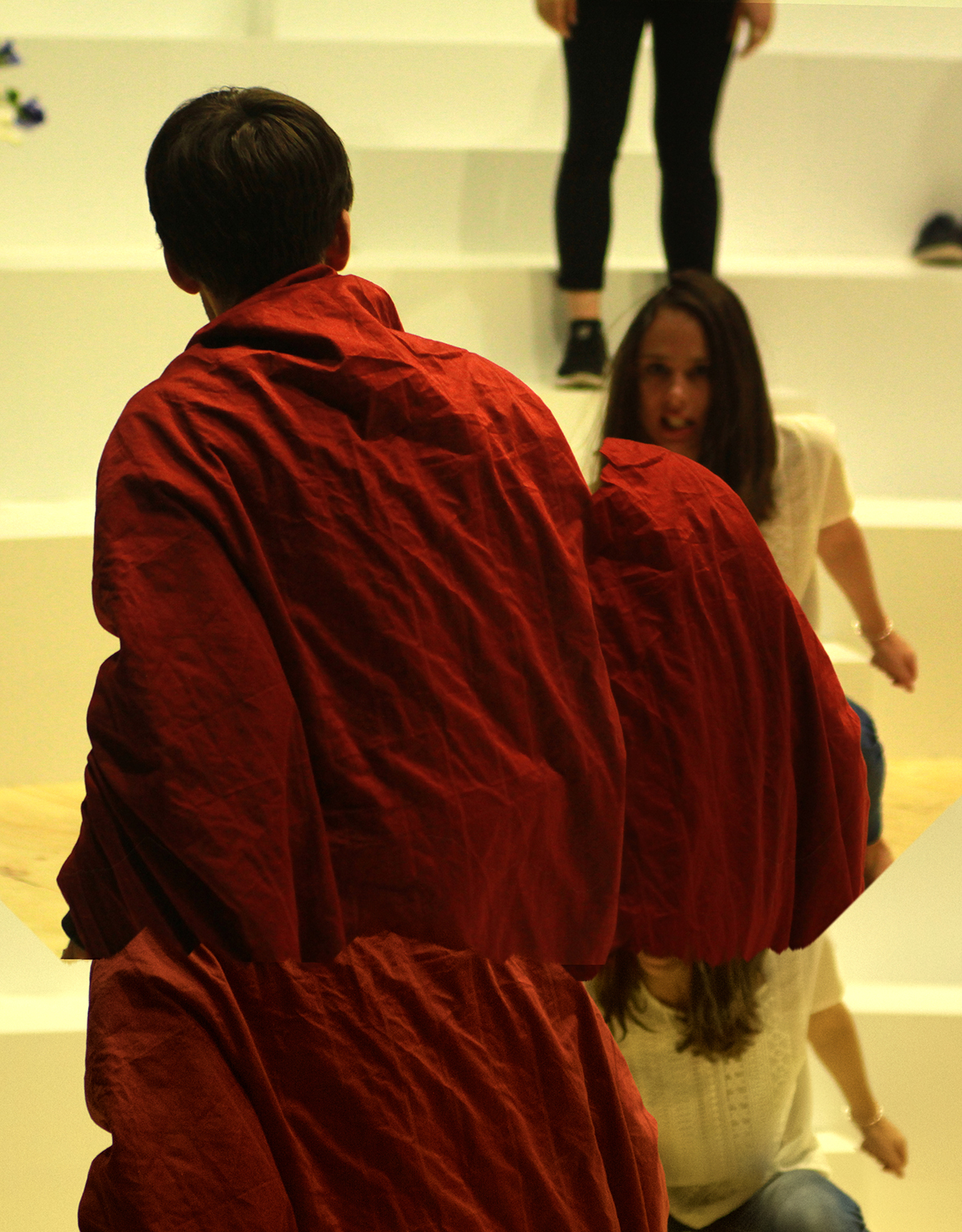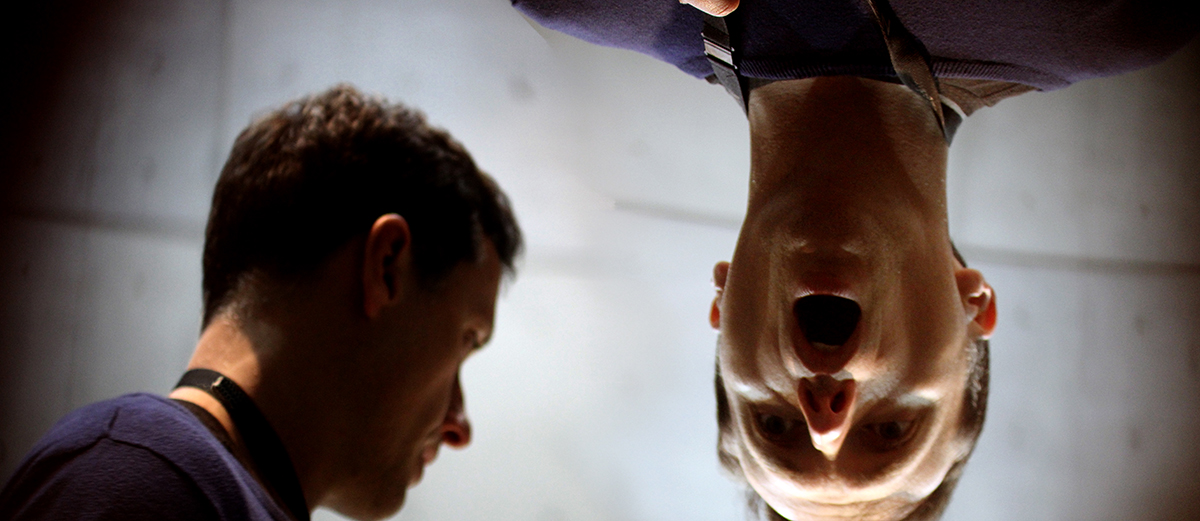
Jack Symonds on Britten’s The Rape of Lucretia
Benjamin Britten’s chamber opera The Rape of Lucretia is as powerful as many a grand opera. Its spare, haunting instrumental scoring and deft character portrayals briskly engender a melancholy mood (Ancient Rome under Etruscan rule), a deceptively seductive night-time ambience (susurrating harp and strings), brutal tensions (men arguing over which of their wives are whores) and escalating suspense (as the Etruscan Tarquinius sets out to seduce Collatinus’ wife Lucretia whom the Romans believe to be resolutely chaste). Ronald Duncan’s libretto, if at times archly showing its age, is economically evocative and aptly aphoristic for a moral drama — “Life is dark except when wine sheds light” — and psychologically striking as in the only utterance Lucretia makes about Tarquinius’ effect on her: “In the forest of my dreams you have always been the tiger.”
Despite a morality play framework with two Christian narrators — a Male Chorus and Female Chorus — guiding our judgment, the opera has the emotional weight and force of a Greek tragedy. But the formal mix is uncomfortable. What are we meant to make of Christian moralising that is as fundamentally limiting for women as the pagan culture it criticises, let alone left wanting in grasping the scale of the tragedy witnessed. I spoke by phone with Sydney Chamber Opera Artistic Director Jack Symonds in a rehearsal break about the substantial challenges of staging the opera. Clearly, Symonds and collaborators have come up with some fascinating strategies to be at once true to and critical of it, but better than that, revealing something more complex in Britten’s attitude to the fate of his heroine.
What attracted you to staging The Rape of Lucretia?
I think it’s one of Britten’s greatest operas and, importantly, I knew that with the right team we could solve its seemingly intractable problems in a very creative way. And that’s the kind of thing that attracts me to a piece really. Something that needs a ‘solve’ and can take a very creative ‘solve’ and that is so rich in musical possibility that you almost can’t say no.
The opera is like a blend of Greek tragedy and a mediaeval Catholic morality play. Is that one of your intractables? How will you frame your production?
I think that two points that Kip Williams and Elizabeth Gadsby, director and associate director respectively, have picked up on — and something we discussed when we first talked about this piece many years ago as the two, not ‘problems,’ but issues one has to look at — are certainly the Christian element and the portrayal of gender roles in the piece. This team has tackled these very much head-on, especially the gender matter.
Essentially, for all his greatness as a composer, Britten never questions gender roles in The Rape of Lucretia. The women sit at home in cotton dresses spinning and waiting for their husbands and these men sit around discussing all women as whores. What Kip and Elizabeth have done is to split up the action and the characters into performing and singing characters by lip-synching gender reversal. This creates an incredible dialogue between the musical content and the performed element. For instance, the three women who play and sing Lucretia and her two maids also perform Tarquinius, Collatinus and Junius by lip-synching to the male singers, and, of course, it’s vice versa for the men. The net effect is both a questioning of and a distancing from the work in terms of how we look at these roles, asking who is complicit in ideas about how men and women behave and the nature of the events that lead to the rape of Lucretia.
How are you approaching the Christian framework of the opera?
I’ve wrestled with it since I first knew the opera. It’s very hard to know what Britten was driving at with this element. He insisted on its inclusion against the advice of all his collaborators — against the director, the librettist and some of the performers. He insisted on this ‘Greek chorus’ of two characters, called Male Chorus and Female Chorus. It’s strange that he needed to have this morality framing. A lot of my thoughts on it come back to the detail in the music and the way I hear it and certainly the way we’ll perform it. Britten questions the morality deeply by asking us whether or not we should in fact be judging this story within a Christian moral framework and what the implications are for all of us if we just apply a received idea of Christian tradition onto a time and a place that was certainly pre-Christian.
The ultimate question asked about the rape and suicide by the Female Chorus towards the end is, “Is this all?” and “How can this happen?” Britten’s music here is incredibly pained, not the beatific halo of Christian morality we might have expected. It’s the same with the Male Chorus who answers her with a parable of how Jesus’ death and resurrection absolved us all of sin, but Britten himself in the music, doesn’t absolve us. He leaves us with an enormous question.
That’s very interesting. I‘d noticed it in recordings, especially the words and singing of the Female Chorus but thought the Male Chorus’ attitude was conventional, even dismissive. But the scoring of instruments so often provides a narration of its own, which I’ll be listening out for in your interpretation.
I think it’s the first chamber opera that deserves the name in that rather than simply being an opera for small forces Britten makes it into a piece of chamber music and zeroes in on the tiniest details of the drama through soloistic instrumentation. While that might seem rather academic, what it actually allows him to do is be freed from the constraints of grand opera. The opera immediately preceding The Rape of Lucretia is Peter Grimes and two more different works couldn’t possibly be imagined. Peter Grimes is essentially an updated 19th century opera. It’s an extraordinary piece and fully deserves people’s love of it, but it’s a 19th century mechanism with 20th century add-ons. The Rape of Lucretia is actually a modernist piece, I think, a completely different take on what an opera can be — a chamber opera with chamber music with which to create a whole new world of operatic possibility.

The Rape of Lucretia, rehearsal image by Samuel Hodge
It’s a remarkable through-written musical and theatrical ensemble work and the solution your team has come up with in terms of gender is interesting because you’re building on something that’s already in the work — the way that the Male and Female Corus sing some of the thoughts of the characters who become silent. So the Chorus pair provide both a moral commentary but also passages of psychological interiority.
That’s right. The way they take sides and the placement of them in the drama means that in this production, rather than being two meta-theatrical figures, they become two of eight players who assume various roles during the production to act out this drama. This frees it from being sort of an embarrassing dumb-show of Roman tragedy, which is a danger.
The music is superb. The night music and night language of the libretto in the music of Acts One and Two is astonishingly seductive but relies on very spare instrumentation, notably in the presence of the harp.
It’s certainly a soloist piece. It’s a wind quintet with a string quartet with double bass, percussion and harp and piano played by the conductor. And what Britten does is use the wind quintet as a wind quartet and the string quartet as a string quartet, as they would play in a chamber music concert. Then he finds all manner of different combinations between them to bleed the edges in sound, with superb technique, to completely re-imagine what we hear in the instrumental accompanying of the singers. Indeed, the harp plays a big role in that it can blend with all these instruments. Sometimes it virtually seems a harp concerto, the writing for it is so relentless. And the piano recitative played by the conductor has a strange relationship with the form of the work — in no other Britten opera is there that kind of relationship. The piano never plays with the orchestra. It’s like a separate world, literally a chamber piece. Sometimes it’s like the rehearsal pianist never went away and you wonder why it’s there. But the punctuation in the recitative is a wonderful way of dividing up the colour palette.
Finally, the almost entire percussion part is made up of timpani and its constant ominous presence, doubled by the other instruments, means that Britten is able to use the sparest resources to create the fullest symphonic effect when he wants. It’s typical of this composer that he’s completely sparing, almost calculatedly finding combinations building up from one to two to three all the way up to the twelve instruments. And that’s a joy to work with. That’s what musicians want to play when they do this kind of work.
There are some remarkable passages, like Tarquinius riding his horse into the Tiber with amazing rhythmic shifts and some beautiful Act Three singing. Who’s singing Lucretia?
Anna Dowsley who is a wonderful mezzo-soprano. She was Young Artist and Principal Artist with Opera Australia for a number of years. She did three of our earliest pieces in 2011 and 2012. It’s great to have her back and in a role that suits her. She has a wonderful sense of gravity but without ever becoming bathetic. She’s able to really carry this role convincingly and able to act as a man superbly. This is a co-production with Victorian Opera and we’re welcoming two of their baritones, Jeremy Kleeman and Nathan Lay, making their company debuts with us. Male and Female Chorus have the biggest roles in the piece, so it’s great to have Celeste Lazarenko and Andrew Goodman. Andrew is a wonderful Evangelist in Bach’s Passions so to have him in this role as a modern evangelist is beautiful indeed. It’s an incredible cast who are very hard-working. When they signed up to play some of these smaller parts, little did they know that they’d be onstage for the full two hours acting all sorts of different parts. This is very much an ensemble piece.
Tell me about the partnership with Victorian Opera.
This is very much a Sydney Chamber Opera team for The Rape of Lucretia — the kind we would have assembled ourselves but having Victorian Opera involved means we can imagine a more ambitious production, show more people our work and potentially have a national reach.
–
Sydney Chamber Opera with Victorian Opera, The Rape of Lucretia, composer Benjamin Britten, musical director Jack Symonds, director Kip Williams, co-director, designer Elizabeth Gadsby; Carriageworks, Sydney, 19, 21, 22, 24, 25, 26 Aug
Top image credit: The Rape of Lucretia, rehearsal image by Samuel Hodge






